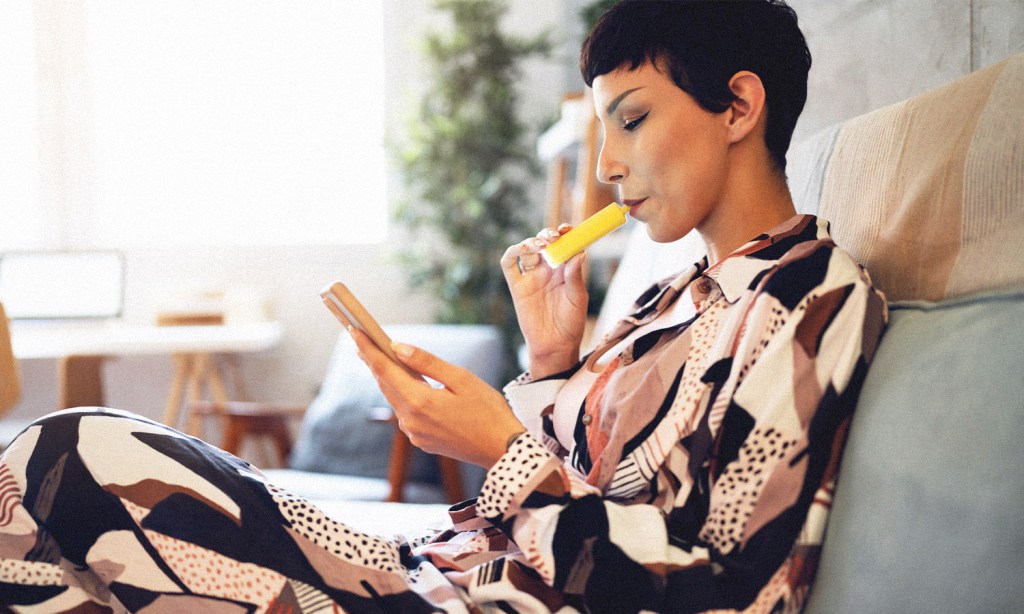It’s the question that everyone who vapes and their concerned friends/parents/teachers wants the answer to: What is actually in a disposable vape?
Mainly manufactured in China, and with no regulations in place, thanks to the blanket banning of the products, it’s difficult to know exactly what people are inhaling when they take a hit of those light-up tubes.
Now, Queensland wants answers. They’ve launched a parliamentary inquiry into the availability and prevalence of vaping devices and their associated health risks.
“Although many vaping products are marketed as being nicotine free, we know that’s not always the case,” said Queensland’s Health Minister, Yvette D’Ath, in a statement.
“And e-cigarettes can contain other chemicals like chemicals found in nail polish remover”.
The Queensland Premier, Annastacia Palaszczuk, has said that her government needs to do more to address this “important health issue” for “current and future generations of Queenslanders.”
“Critically, we need to have greater knowledge about what vaping devices contain, does anyone have an understanding of what they are inhaling? Do these devices contain nicotine or, worse, do they contain dangerous or toxic chemicals? What are the possible health risks and long-term consequences?” Palaszczuk said in a statement.
The government even cited research by Cancer Council Australia that indicated more than 80% of people in the state want the government to stop young people from becoming addicted to nicotine.
“Queenslanders should know what they’re putting into their bodies, and as a government, we need to know the best way to address vaping,” D’ath continued.
“It’s important people understand the long-term health risks that may be associated with this relatively new trend.”
The Queensland Vaping Inquiry
At a national meeting in February, the country’s Health Ministers resolved to create a national ‘e-cigarette Working Group.’ This group will aim to review and advise on measures that will protect young people from the possible dangers associated with vaping.
This inquiry is part of that national strategy, and the Queensland government has said that it will focus on finding out exactly how many people use vapes, especially in their younger demographics.
They’re also examining exactly what the chemical makeup of a vape is, plus the potential health impacts of those ingredients.
Finally, they’re going to be analyse what schools are doing to prevent students from taking up vaping and review the ways that they can promote the health impacts of vaping to young people.
Previous studies into the ingredients of vapes sold in Australian corner shops determined that “100%” contained between one and 18 chemicals with “unknown effects on respiratory health.” That 2020 study, funded by the Lung Foundation Australia, indicated that 21% of them contained nicotine and that 65% contained chemicals “likely to be toxic” if vaped repeatedly.
An extension of that study, published in 2021, found that e-cigarette vapour contains low levels of heavy metals, numerous lung-irritants, and “probably” microplastics.
While the Queensland government, along with many other government and health bodies, are concerned about the rise in young people who have never smoked cigarettes picking up the habit, GPs and the medical field are divided over their benefits and potential harms.
Some argue that these are useful tools to help get life-long tobacco users off a far more dangerous product. Others say that vaping is a gateway to tobacco usage with no known long-term consequences.
Palaszczuk has, perhaps somewhat counterintuitively, highlighted this evidence. She did this discussing how daily smoking rates in the Queensland have declined by 47% since 2002.
“Fewer people are smoking, but we are seeing a significant number of people vaping,” she said.
“If vaping is a stepping stone to smoking, we need to ensure Queenslanders, especially young Queenslanders, are aware of the health risks”.
The findings from the inquiry are scheduled to be reported by the end of August and will likely inform future policy decisions.
Vape Laws QLD
E-cigarettes, regardless of if they contain nicotine or not, are considered smoking products under Queensland law and are therefore regulated by the Tobacco and Other Smoking Products Act of 1998.
The law says that vapes cannot be sold to anyone under the age of 18, cannot be advertised, promoted, or displayed at retail stores, and cannot be used in non-smoking areas such as pubs and restaurants or in sign-posted outdoor areas.
What’s more, just like the rest of the country, vapes containing nicotine are illegal unless they have been prescribed by a doctor in accordance with the Therapeutic Goods Administration ruling of 2021.
Nicotine itself is considered a “dangerous poison” and a Schedule Seven drug.
However, one of the key issues in this debate is that the laws are rarely enforced, despite repeated attempts at ‘cracking down’ on their usage and sale.
A 2022 study on the vaping habits of teenagers determined that, of 700 surveyed, 32% had tried vaping. Additionally, 70% of those who regularly vaped said that they didn’t buy their device directly. Of those who did, half of them bought a vape from a friend, while 30% said that they bought their vape from a petrol station, tobacconist, or convenience store. Others purchased their vapes through social media or online websites.
Related: Why Are So Many Young People Taking Up Vaping? The Answers Are Foggy at Best
Related: The End of Tobacco? How the NZ Cigarette Ban Could Be Coming to Australia
Read more stories from The Latch and subscribe to our email newsletter.







